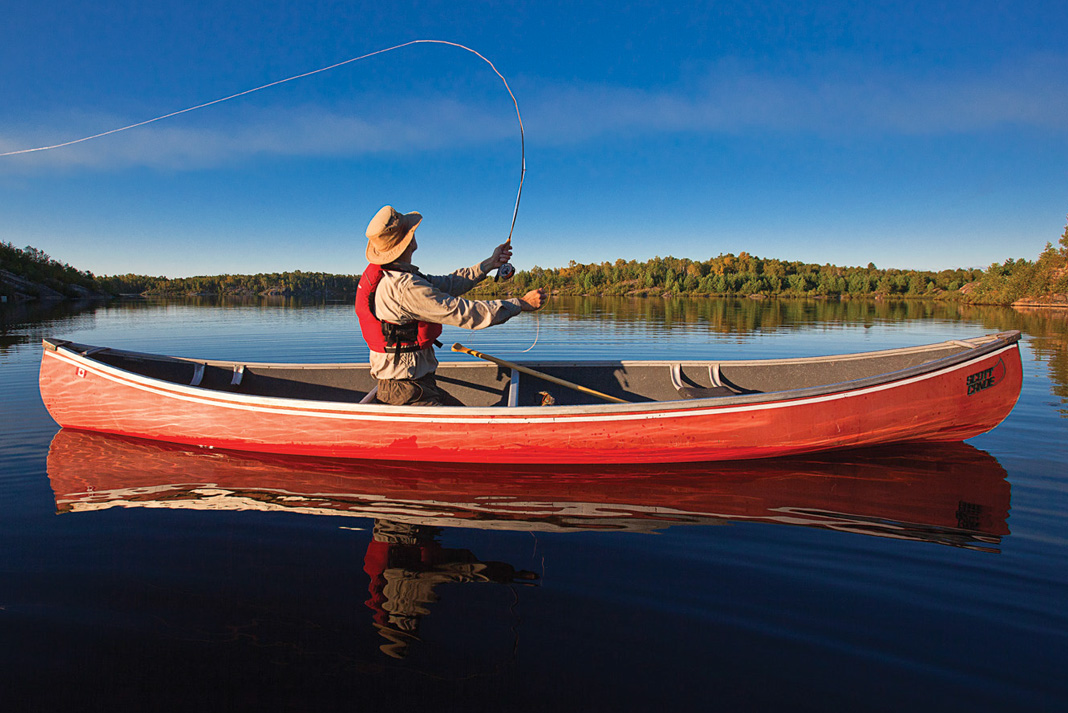Fly fishing is, to most enthusiasts, the most beautiful form of fishing. It’s most common to see pictures of fly fishermen standing characteristically waist-deep in a stream or river, but Ben Duchesney shares his opinion on expanding this art form to larger bodies of water by way of the canoe. Learn to cast from a canoe and you’ll fall in love with the beautiful combination of canoeing and fly fishing. You may even catch a few.
How to Try Fly Fishing from Your Canoe
Master the Cast
The first mistake new fly casters make is trying to muscle the cast. Like swinging a golf club, the power of the cast comes from technique, not big biceps. Keeping a straight wrist, start your back cast by raising your rod tip backwards, loading tension in the rod tip.
At the top of the cast, at an angle of 1 o’clock, snap your arm to a stop. You can also look at your line and stop the back cast when your leader is about to come off the water. Stopping the the backcast abruptly will ensure the line unfurls evenly.

Once the rod stops vibrating from the back cast and you feel the rod tip being loaded in the other direction, begin your forward cast. Leading with the elbow, snap the rod grip forward by pressing forward with your thumb and pulling back with your ring and pinky fingers. This will lay out the cast evenly.
As world-famous casting instructor Joan Wulff says, the motion is similar to opening a screen door, pressing the button with your thumb and pulling the door open with your pinky and ring finger. Stop the rod when your thumbprint is pointing towards your target.
Maintain Balance
When casting, make sure your body is centered in the canoe and your hips are straight and silent. Stick with casting straight ahead for now, and just move the canoe if you need to change direction. Casts to the sides of the boat have a tendency to rock the boat more. If you start rocking the boat while casting, not only will your cast suffer but you may lose your balance.
Manage the Line
One of the trickiest and most frustrating parts of fly fishing is line management. Add gunwales and paddles and it gets even worse. Before each cast, make sure your line is free from snags and gathered at your knees. If you keep snagging, get a shirt or small bucket and place it in front of you. This will act as a stripping basket and help to keep your line clear.
What You’ll Need
- Graphite fly rod
- Large arbor reel
- Weight forward, floating fly line
- 10-foot leader
- Canoe
- Zen-like patience
Quick Casting Tips
- The power of the cast comes from your wrist and arm movement.
- Slow is smooth and smooth is stable. If you have trouble timing the cast, slow down.
- Before you get in a canoe, practice your technique from the lawn while sitting flat or kneeling. Then, try in a canoe on your own.
Watch the video of this technique here:
Ben Duchesney is an active paddle angler and former web editor of Kayak Angler. When he’s not fishing, he’s working on his first book, a fly fishing manual.
“There is no greater fan of fly fishing than the worm.” –Patrick McManus | Feature photo: Courtesy Ontario Tourism









This is cool – when I move down to Arkansas I plan to learn to fly fish in the White River. I believe the trout fishing down there is very popular. Good post!